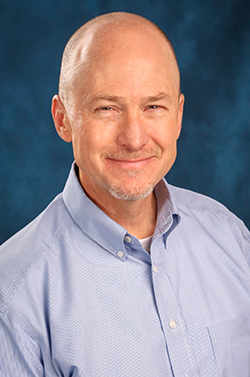
Greg Adams, LCSW, ACSW, FT
Program Coordinator
Center for Good Mourning
[email protected]
Living in Seasons
North of the equator, and north of the tropics, we are in the season of winter. The grass is brown and bare branches are all around. It is a season of layers, scarves, and gloves. Of ice scrapers, frost, and wind chills. Birds, those who are left, puff up for warmth and search for food. For many of us, it is a season of inside with a sweater and a blanket and a cup of something warm.
South of the equator, and south of the tropics, the season is summer. The grass is green, and instead of bare branches, there are bare arms and legs for both comfort and style. It is a season of single layers, if at all, and wide-brimmed hats. Of sunscreen, welcome rain showers, and heat indexes. Birds build their nests and feed their young with food in abundance. For many of us, it is a season of outside with a seat in the shade and a cold drink.
Elsewhere and at other times, there are rainy seasons and dry seasons. Seasons of plenty and seasons of want. Spring seasons where what looks dead comes to life and autumns where leaves put on a show before the trees, and some animals, settle in for a long sleep. Seasons for leaving, for returning, and for staying put.
In our living and in our losing, we caring people have other kinds of seasons. Heavy seasons. Stormy seasons. Dry seasons when it seems it will never rain. And monsoon seasons when it feels like the rain will never stop.
Serious illness can be a season of its own filled with twists and turns, sometimes expected but often sudden and shocking. It can be a season of burden and fear. Yet during its dis-ease, there can be moments of grace and experiences of beauty. Serious illness is a season which takes over the rest and colors our vision. When it ends, as all seasons eventually end, it can do so abruptly and without warning or gradually and in pieces, whether it ends in recovery or ends our lives. However it goes, if very serious, it will end our lives as we knew them, ending one season to begin another.
After the death of one important to us, a family member or friend, a role model or hero, we are certainly in a new and different season. A season of grief and of mourning. And there are seasons within seasons. Seasons of numbness and of pain. Of emptiness and yearning. Of bitter and then bittersweet. Seasons of remembering and of comfort. A sometimes surprising experience when new life and new living sneaks in and we realize that a different season has begun.
The nature of seasons tells us some important things. Life changes. It will not always be as it is today. There will be a new season. This is both bad and good news. When we want to hold on to what is precious to us today, the reality that seasons change can be a source of worry and distress. When we are deep in a place of suffering, the reality that seasons change can be a source of hope and encouragement.
Life is complicated, of course, as we often find parts of ourselves desperately holding on while other parts of us pray for change. Overlapping hopes and fears. Seasons of stability and transition.
For much, if not for most, of our lives, we are not in charge of the seasons. Our job is to discern the seasonal changes and adjust. While often challenging, the fact that our lives is a series of seasons is mostly a source of comfort and of hope. It means that change is possible and that we are wired for growth. In truth, it also means that we are wired for loss for no season, at least in this world, lasts forever.
Seasons come and go throughout our lives, but what of the love we have given and received and the bonds we have nurtured with those both living and dead? Our experience of love and connection certainly varies as the differences of each season make a difference for our bodies, heads, and hearts. Yet no matter the variations, the love and connections we have been blessed to receive survive and continue through every season and until our seasons are no more, if there ever is such a thing.
If you haven't already, please take this brief survey and let us know what you think of The Mourning News. Your feedback on The Morning News - what's helpful and what's not, ideas and suggestions, and questions to be addressed in future editions - is very welcome.
Send comments and questions to [email protected].
Between Two Kingdoms: A Memoir of a Life Interrupted by Suleika Jaouad. Random House, 2021. www.suleikajaouad.com

Susan Sontag wrote in Illness as Metaphor that “Everyone who is born holds dual citizenship, in the kingdom of the well and in the kingdom of the sick.” It is this quote and metaphor which inspired the title and theme of Suleika Jaouad’s remarkable memoir of a young life, illness, and its aftermath. It is a remarkably well-told story.
Most who are diagnosed with cancer experience hints and signs that something is awry with their bodies. Fortunately, most of these symptoms are usually signs of a less threatening condition, but sometimes, and our chances increase as we get older, the diagnosis is cancer.
When a spouse or partner dies, the spouse or partner left behind needs both support and practical guidance about living alone and handling the financial and legal aspects of being a widowed person. These organizations provide helpful information and resources for just these needs—for surviving spouses/partners of any gender.
https://www.wingsforwidows.org/ and https://soaringspirits.org/resources/
Grieving parents are sometimes encouraged to “let go” of the child who died, but this is misguided advice. More helpful is the idea of “continuing bonds”--finding ways to stay connected in a new reality. The ever-helpful Courageous Parents Network has an excellent guide about continuing bonds—available in both English and Spanish.
Cardiopulmonary resuscitation (CPR) is an amazing advance in medicine. It is also more limited in its benefits than most of us understand. Choosing whether to do CPR is a nuanced decision and deserves more careful consideration than is often given. This reflection on CPR can help with that.
ARKANSAS PROGRAMS
Good Mourning Grief Support Groups
Good Mourning Grief Support Groups are for any child or teen, ages Kindergarten through high school, who have experienced the death of a family member or friend. There are also support groups available for the adults in the family. There is no charge for the program, but a completed application is required for each child or teen. Each series goes for 8 weeks:
In-person series on Tuesdays on March 26, 2024 with a Parent Orientation on Tuesday, March 12.
To request an online application, go to www.goodmourningcenter.org. For more information, call 501-364-7000.
Camp Healing Hearts
Camp Healing Hearts is free to Arkansas children and families coping with grief and bereavement. In 2024, Camp Healing Hearts will take place on Friday evening and Saturday, May 17-18 as an overnight camp. This event is sponsored by Kaleidoscope Grief Center, is held at Camp Aldersgate in Little Rock, and includes:
Alliance for Grief and Loss will be provided online in a video-conference format.
The Alliance for Grief and Loss is an informal coalition of helping professionals interested in grief and loss issues. Meetings will be on Zoom. “Business” will be at 11:30 am and the program will begin at 11:45 am unless otherwise noted. Live presentations will end at 1:00 pm and 90-minute webinars will end at 1:30 pm. Zoom connection information will be sent prior to each meeting. Unless otherwise noted, meetings will be on the second Friday of the month.
| Date | Topic |
| March 10 |
Bereaved Parent to Funeral Director, Jodie McGinley |
| April 26, Note date change |
HFA Living with Grief: Diagnosis: Prolonged Grief Disorder |
| May 10 | Book review and discussion—book to be chosen in the spring |
Please email [email protected] for more information or to be added to the email mailing list for the Alliance for Grief and Loss.
All are welcome.
Association of Death Education and Counseling (ADEC) Annual Conference—Houston, Texas and virtual options. April 11-13 with pre-conference sessions also available. https://www.adec.org/page/2024-Conference
Mount Eagle Grief Retreat
December 6-8, 2024
A retreat to help support and equip those in the helping professions to be of service to others experiencing grief led by Greg Adams from the Center for Good Mourning at Arkansas Children’s Hospital. Limited to twelve participants. For more information and to register, go to https://mounteagle.org/events.